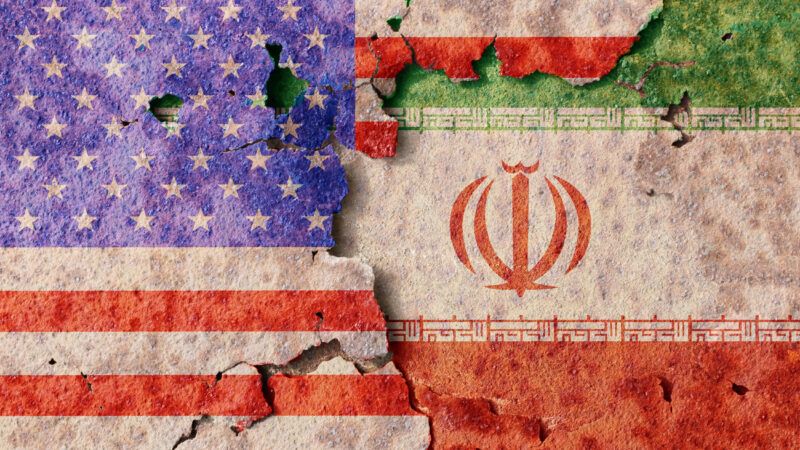Sanctions Are for Losers
While sanctions fail to change Iran's policies, they inflict severe hardships on civilians and rally support for the regime.

On April 13, Iran launched an unprecedented retaliatory drone and missile attack on Israel, leading the U.S. and its allies to reach once again for their favorite weapon of war—sanctions.
This knee-jerk reaction was as predictable as it was ill-founded, according to the scholarly research. In Nicholas Mulder's 2022 treatise The Economic Weapon: The Rise of Sanctions as a Tool of Modern War, he traces the history of sanctions from the blockades in World War I to today's morass of economic sanctions. Mulder concludes that "the historical record is relatively clear: most economic sanctions have not worked."
Mulder's treatise was followed by the book Backfire: How Sanctions Reshape the World Against U.S. Interests by Agathe Demarais. Drawing on her experience as an economic policy adviser for the diplomatic corps of the French Treasury, Demarais observes that sanctions tend to unite rather than isolate countries that are at odds with the U.S. and its allies, thereby transforming the geopolitical landscape and global economy to the detriment of U.S. influence.
The case of Iran is particularly illustrative of these points. In the recent How Sanctions Work: Iran and the Impact of Economic Warfare, authors Vali Nasr, Narges Bajoghli, Djavad Salehi-Isfahani, and Ali Vaez present a detailed study on the long-term impacts of economic sanctions on Iran. Nasr is an Iranian-born distinguished professor of international affairs and Middle East studies, a veteran diplomat, and a member of the U.S. State Department's Foreign Affairs Policy Board. He and his collaborators studied the economic data and conducted long-form oral history interviews with 80 residents of Iran. The authors demonstrate that decades of Western sanctions, including the Trump administration's "maximum pressure" campaign of 2018, have neither modified Iran's international behavior in ways intended by policy makers nor precipitated any semblance of regime change.
Instead, sanctions have inflicted severe hardships on ordinary Iranians. The middle class has shrunk significantly from 45 percent in 2017 to 30 percent in 2020. If that wasn't bad enough, Nasr and his colleagues estimate that the death toll attributable to the humanitarian catastrophes triggered by sanctions—such as food shortages and the breakdown of critical medical systems—has amounted to "hundreds of thousands."
By imposing sanctions, the U.S. sought to crush Iran's economy and make life so difficult for ordinary Iranians that they would rise up and either change the regime's behavior or overthrow it altogether. However, this strategy relied on the assumption that Iranians would blame their misery on their own government and not those imposing the sanctions. Rather than blaming their government, Iranians have experienced a classic rally-'round-the-flag effect with sanctions inadvertently solidifying support for the regime. By creating animus against the U.S., sanctions have turned Iran's hurting middle class into either de facto or de jure supporters of Iran's leaders.
This is reflected in the interviews conducted by Nasr and his colleagues. Hamid, an interviewee and a disaster management specialist in Iran's civil society sector, said of sanctions: "All they've done is make the Revolutionary Guard more powerful. Those of us in civil society are suffocating."
Reza, a disillusioned university professor, echoed Hamid's concerns: "If it's not the nuclear issue, it's our ballistic missiles. If it's not our ballistic missiles, it'll be human rights. If it's not human rights, [the U.S.] will find another reason [to sanction Iran]."
Furthermore, Nasr and his co-authors contend that sanctions have driven the Iranian government to adopt more defensive and aggressive postures—the very behaviors that spurred the U.S. to impose sanctions on Iran in the first place. This pattern of behavior, where a sanctioned state becomes more militaristic and risk-taking, is well-documented and aligns with what economic theory predicts about actors with "nothing to lose." This was highlighted by William L. Silber in The Power of Nothing to Lose: The Hail Mary Effect in Politics, War, and Business, in which he elucidates how extreme pressure during times of "war" can lead nations to take bold, often reckless actions.
It's clear that the sanctions landscape is littered with failure—not just in Iran but also in Syria, Venezuela, North Korea, Cuba, and, most recently, Russia. Despite their dismal track record, a 2021 Treasury Department report showed that the use of sanctions had surged by a stunning 900 percent since 2000. The persistence in using this tool highlights a disconnect between expected and actual outcomes in U.S. foreign policy strategy.
If the U.S. and its allies had aimed to create a more moderate Iran or change the regime with sanctions, they have failed. What is needed is a more nuanced and effective foreign policy that rests on diplomacy and does not inadvertently strengthen the very behaviors and regimes the U.S. aims to modify.

Show Comments (16)